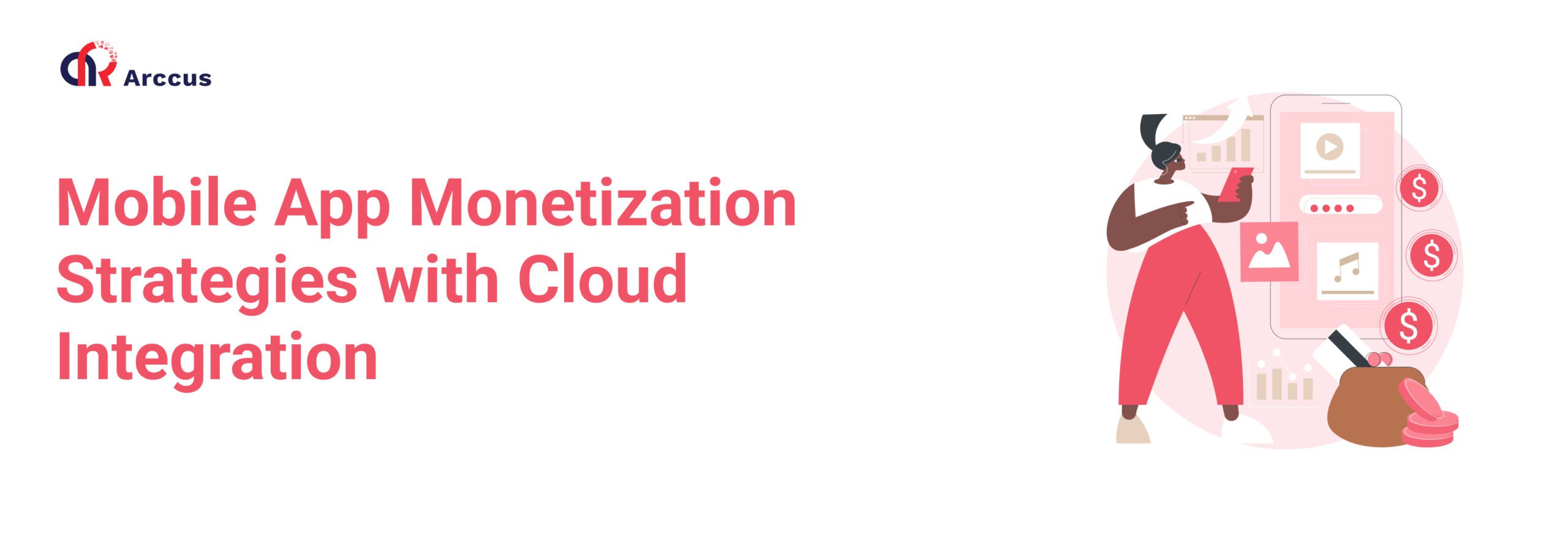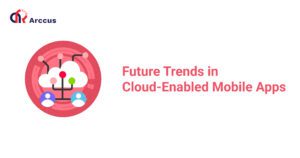Mobile App Monetization Strategies with Cloud Integration

Mobile App Monetization Strategies is the process of earning revenue from a mobile application, such as a smartphone or tablet app. Developers and app owners use various strategies to generate income from their apps, often in an effort to cover development costs, make a profit, or sustain ongoing operations.
Monetizing a mobile app with cloud integration involves generating revenue through various strategies while leveraging cloud services to enhance user experience, scalability, and functionality. Here are some effective mobile app monetization strategies with cloud integration:
- In-App Advertising
- Freemium Model
- Subscription Model
- In-App Purchases
- E-commerce Integration
- Data Monetization
- Affiliate Marketing
- SaaS Integration
- Content Licensing
- Crowdsourced Funding
- Geo-Targeted Services
- API Licensing
- Cloud-Based Premium Features
- Referral and Affiliate Program
- Data Storage and Bandwidth Plans
- Loyalty and Reward Programs
- Cross Promotion
When implementing these Mobile App Monetization Strategies, it’s crucial to balance revenue generation with user experience to ensure user retention and satisfaction.
Benefits of Cloud Computing in Mobile Apps Monetization Strategies
Cloud computing in mobile apps offers several benefits when integrated into them. A very few of the important benefits include:
-
Scalability and flexibility
Cloud computing allows you to scale your app resources up or down as needed, ensuring optimal performance even during traffic spikes. They also offer various services and tools, allowing mobile app developers to choose the services that best fit their needs.
-
Cost-effectiveness
Cloud computing can help reduce the upfront costs associated with infrastructure and server maintenance. You only pay for the resources you use, making it cost-effective for startups and small businesses.
-
Enhanced storage and data management
Cloud storage solutions provide a reliable and scalable way to store app data, ensuring that user data is protected and easily recoverable in case of data loss.
-
Improved performance
Cloud providers have data centers distributed globally. Utilizing these centers can reduce latency and improve app performance for users worldwide.
-
Real-time updates and synchronization
Cloud providers manage server maintenance, security updates, and software upgrades and enable multi-tasking. This reduces the burden on app developers and ensures that the app remains secure and up-to-date.
Key Cloud Services for Mobile Apps
Cloud computing in mobile apps offers a range of beneficial services. Very few of the important cloud services for mobile apps are as under:
-
Cloud storage
Cloud storage is a service that allows you to store and access your data (such as files, documents, photos, videos, and more) on remote servers over the internet. This means your data is stored in a distributed and redundant manner on servers operated by a cloud storage provider, rather than on a local hard drive or other physical storage device.
Common cloud storage providers include:
-
- Google Drive
- Dropbox
- Microsoft OneDrive
- Apple iCloud
- Amazon Web Services (AWS) S3
- IBM Cloud Object Storage
- Box
- Mega
- Sync.com
-
Cloud hosting and infrastructure
Cloud hosting and infrastructure refer to the delivery of computing resources and services over the internet using cloud computing technology. This approach allows businesses and individuals to access and use powerful computing resources, such as servers, storage, networking, and software applications, without the need to own or manage physical hardware.
Cloud hosting and infrastructure have become integral to modern IT operations, enabling businesses to focus on their core activities without the burden of managing and maintaining physical hardware and data centers.
-
Backend as a Service
Backend as a Service (BaaS) is a cloud computing service model that provides developers with a ready-made backend infrastructure for their applications. BaaS abstracts and simplifies many of the complexities involved in developing and managing the backend of a mobile or web application, allowing developers to focus more on the front end and user experience.
BaaS is beneficial for developers because it can significantly reduce development time and effort. It is particularly valuable for startups and small development teams that may not have the resources or expertise to build and manage a complex backend infrastructure from scratch, especially popular for mobile app development.
-
Content delivery networks
Content delivery networks are a crucial part of delivering content, including mobile app data, efficiently and reliably to users around the world. CDNs are distributed networks of servers strategically placed in various locations to minimize the physical distance between the user and the content, thus reducing latency and ensuring faster content delivery. For mobile apps, CDNs can help in delivering app assets like images, videos, scripts, and other resources to users.
Several cloud service providers offer CDN services for mobile apps which are categorized as:
-
- Amazon CloudFront
- Akamai
- Cloudflare
- Google Cloud CDN
- Microsoft Azure CDN
- Fastly
Use Cases
Mobile app cloud computing offers numerous benefits in each of the areas. Explore each of them a bit more:
-
Social media and messaging apps
Cloud computing in mobile apps allows for real-time message synchronization, media sharing, and efficient user data management. This is typically achieved through cloud based messaging services, such as cloud hosted chat applications or messaging APIs. Cloud storage solutions often offer version control and access permissions, making it easier to collaborate on media content.
-
On-demand services and e-commerce apps
Scalable cloud resources accommodate variable traffic. It dynamically allocates and deallocates computing, storage, and networking resources in response to changing workloads and traffic patterns. Cloud-based databases ensure efficient order processing. They often offer features like automated backups, disaster recovery option and security measures to protect the integrity of data and ensure compliance with industry regulations.
-
Mobile gaming
Cloud services enable multiplayer gaming, leaderboard management, and efficient content delivery, enhancing the gaming experience. Mobile App cloud computing offer Content Delivery Networks (CDNs) that distribute the game updates to players all over the world. Cloud services store and manage player scores and rankings, making it easy for players to track their progress and compete with others.
-
Enterprise and productivity apps
Cloud integration offers secure data storage, synchronization, and collaboration tools for business-oriented apps. It also provides cost efficiency, scalability, and accessibility, making it an indispensable resource for businesses waiting on to streamline their operations and accommodate the elaborating digital landscape.
-
Health and fitness apps
Cloud-based data storage and real-time synchronization are instrumental in managing and analyzing user health data, offering accessibility, scalability, security and analytical capabilities that can lead to more informed healthcare decisions and better patient outcomes.
Future Trends in Cloud-Enabled Mobile Apps

Cloud-enabled mobile apps continue to evolve as technology and user preferences change. Several trends are expected to shape the future of these apps:
-
Edge computing
Edge computing will be used to process data closer to the source, reducing latency and improving real-time performance for mobile apps. This is particularly important for applications requiring low latency, such as augmented reality (AR) and autonomous vehicles.
-
Serverless computing
Serverless architecture will continue to gain prominence, allowing developers to focus on coding without managing server infrastructure. It provides a scalable and cost efficient way to build cloud-enabled mobile apps.
-
5G technology impact
The rollout of 5G networks will enable faster data transfer and lower latency, enhancing the capabilities of cloud-enabled mobile apps. This will support high-definition video streaming, augmented reality experiences and IoT integration.
-
AI and machine learning integration
Mobile apps will increasingly utilize cloud-based AI and machine learning services for features like personalization, recommendation engines, and natural language processing. This will improve user experiences and add value to apps.
Also Read: Mobile App Marketing Strategies To Increase Downloads And User Retention
Future prospects and the continued importance of cloud technology in the mobile app industry
Cloud technology will continue to play a crucial role in the mobile app industry for the foreseeable future. Its importance is driven by several key factors:
-
Scalability:
Cloud services enable mobile app developers to scale their infrastructure up or down based on demand. This is crucial because the mobile app industry is highly dynamic, and app usage can spike suddenly. Cloud providers offer elastic computing resources, allowing developers to meet these changing demands without investing in and managing physical hardware.
-
Cost-Efficiency:
Cloud technology helps mobile app developers save costs by eliminating the need to purchase and maintain physical servers. Instead, they can use a pay-as-you-go model, where they only pay for the resources they actually use.
-
Accessibility and Cross-Platform Compatibility:
Storing data and functionality in the cloud allows users to access the same content and services from multiple devices, whether it’s a smartphone, tablet or desktop computer. It’s essential for modern apps, as users expect a seamless experience across their devices.
-
Data Storage and Management:
Cloud-based databases and storage solutions simplify data management for mobile apps. They offer high availability, data redundancy, and robust security features. This is crucial for apps that rely on user-generated content, real-time updates or extensive databases.
-
Collaboration and Remote Work:
The ability to collaborate on app development and maintenance remotely is more important than ever, given the global nature of the industry and the growth of remote work. Cloud platforms facilitate team collaboration, making it easier for developers to work together from different locations.
-
Real-Time Functionality:
Cloud technology enables real-time updates and synchronization for mobile apps. This is crucial for apps that require instant communication, like messaging apps or collaborative tools, as well as apps that rely on real-time data, such as location-based services.
-
DevOps and CI/CD:
Cloud technology supports the DevOps and Continuous Integration/Continuous Deployment (CI/CD) practices that are essential for agile app development. It enables automated testing, deployment, and monitoring of apps, reducing time-to-market and enhancing overall app quality.
-
Security and Compliance:
Cloud providers invest heavily in security and compliance measures, often more than individual businesses can afford. This makes cloud technology a solid choice for storing and processing sensitive data, which is increasingly important as privacy and data protection regulations continue to evolve.
Conclusion:
The mobile app industry will continue to rely on cloud technology for its scalability, cost efficiency, accessibility, data management, security, and integration capabilities. Additionally, always respect user privacy and comply with relevant regulations, such as GDPR and CCPA, when handling user data in the cloud. However, as the industry evolves, cloud technology will adapt to meet its changing needs and continue to play a vital role in shaping the future of mobile apps.